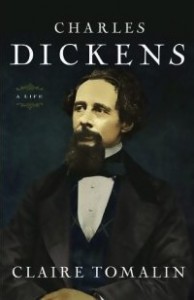One of the unfortunate effects of e-readers is that you can no longer press a book you’ve just finished into someone’s hands and tell them they absolutely must read this but they’ll be in trouble if they don’t give it back. It also makes spying on fellow commuters’ reading a lot less interesting. So, I have two books on the go at the moment, my usual reading pattern. One is on the kindle for the commute and the other is my bedtime reading.
Now the one on the kindle is sort of weird. It’s a romantic contemporary by an English writer and it’s not quite as strange as the one by another English writer where h/h would suddenly fall into a liplock and then resume polite conversation. Many times. There’s a lot of food in this one and people politely offering tea/coffee which seems to be a characteristic of English fiction.
And, segueing effortlessly into the next topic… Charles Dickens is always writing about food too.
Next day, child swallowed two beads; the day after that, he treated himself to three, and so on, till in a week’s time he had got through the necklace — five-and-twenty beads in all. The sister, who was an industrious girl and seldom treated herself to a bit of finery, cried her eyes out at the loss of the necklace; looked high and low for it; but I needn’t say, didn’t find it. A few days afterwards, the family were at dinner — baked shoulder of mutton and potatoes under it — the child, who wasn’t hungry, was playing about the room, when suddenly there was the devil of a noise, like a small hailstorm. (Pickwick Papers)
George Orwell, in his essay on Dickens comments:
As a whole, this story might come out of any nineteenth-century comic paper. But the unmistakable Dickens touch, the thing that nobody else would have thought of, is the baked shoulder of mutton and potatoes under it. How does this advance the story? The answer is that it doesn’t. It is something totally unnecessary, a florid little squiggle on the edge of the page; only, it is by just these squiggles that the special Dickens atmosphere is created.
 My other reading–after that somewhat long squiggle on the edge of the page–is Claire Tomalin’s biography of Dickens, which is terrific. I could go on and on about this book and Dickens’ strange life, but one thing that surprised me is that even his contemporaries didn’t like his portrayal of women.
My other reading–after that somewhat long squiggle on the edge of the page–is Claire Tomalin’s biography of Dickens, which is terrific. I could go on and on about this book and Dickens’ strange life, but one thing that surprised me is that even his contemporaries didn’t like his portrayal of women.
They’re either dumb and pretty (begging to be killed off or humbled), saintly (sometimes the same) or straight out of a melodrama (much writhing and breast-beating, doubtless must die as Bad Girls do). Even a tough girl like Lizzie Hexham (Our Mutual Friend), whose occupation is fishing corpses and other flotsam and jetsam out of the Thames, has to be warned that she is in moral danger when she is pursued by Eugene Wrayburn. Really, Mr. Dickens? You don’t think a working-class girl (with impeccable and inexplicable good diction) wouldn’t know about the birds and the bees? Or, horrors, see a liaison with a rich bachelor as an opportunity?
So what are you reading?
And don’t forget, Carolyn’s contest is still open, affording the delightful prospect of reading about hot demons.

Like you Janet, I’m reading several books at one time, on both Nook and paperback. Right now I’m in the midst of Joelle Charbonneau’s first cozy Murder for Choir. I’m also reading on my Nook, Deanna Raybourn’s A Spear of Summer Grass as well as Andrew Rose’s The Woman Before Wallis: Prince Edward, the Parisian Courtesan, and the Perfect Murder.
I also agree with you about the women in Dicken’s. Even his daughter Katie was not impressed. I haven’t read Claire Tomalin’s biography but I did read her biography of Ellen Ternan which is being made into a movie with Ralph Fiennes as Dickens and Felicity Jones as Ellen.
Great news about the movie! I like her bio of Dickens more than hers of Austen’s, where I thought she speculated a bit too much.
Actually, there were a number of women in Dickens who impressed me, but they were never the heroine. I did like Lizzie Hexham though, as at least she exhibits some personality.
Our Mutual Friend is such a strange book, so many contradictions. Some of it–not only the female characters–made me very uneasy, like the Boffins’ plot to trick Bella.
I just finished Joe Hill’s The Heart Shaped Box. For the first time in a bit, I don’t quite know that to think of it. It was a slow read for me because it was depressing. Then it got scarcy and tense which I liked.
And THEN it looked like the two women in the book were both going to die for the hero, who wasn’t that great a person and I nearly DNF’d because I’m so sick of male writers whose female characters are in love with the hero because … um …. um ….
But that didn’t quite happen, but I think overall, I didn’t like this book even though it was really well written and suspenseful. I dunno.
I have almost bought this book a couple of times but now I’m glad I didn’t!